Welcome to the vibrant world of Indian Fruits! India, a land of diverse cultures, languages, and flavours, boasts an incredible variety of fruits that are not only delicious but also steeped in rich traditions and history. In this colourful journey, we will explore the names of these fruits in English, unravelling the fascinating tapestry of Indian agriculture and culinary heritage.
From the lush orchards of Kashmir in the north to the tropical groves of Kerala in the south, Indian Fruits are as diverse as the country’s landscapes. Each fruit has a story to tell, a unique taste to savour, and a cultural significance that reflects the essence of different regions in India.
40+ Fruits Name In English And Hindi
| Serial Number | Fruits picture | English Fruits Name | Hindi Fruits Name |
| 1 |  | Apple | सेब |
| 2 |  | Banana | केला |
| 3 |  | Mango | आम |
| 4 |  | Orange | संतरा |
| 5 | 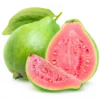 | Guava | अमरूद |
| 6 |  | Papaya | पपीता |
| 7 |  | Pineapple | अनानास |
| 8 |  | Grapes | अंगूर |
| 9 |  | Pomegranate | अनार |
| 10 |  | Watermelon | तरबूज |
| 11 |  | Muskmelon | क़तरीर |
| 12 |  | Lychee | लीची |
| 13 |  | Coconut | नारियल |
| 14 |  | Jackfruit | कटहल |
| 15 |  | Kiwi | कीवी |
| 16 | 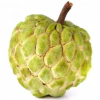 | Custard Apple | शरीफा |
| 17 |  | Blackberry | जामुन |
| 18 |  | Dragon Fruit | ड्रैगन फ्रूट |
| 19 |  | Plum | आलूबुख़ारा |
| 20 |  | Raspberry | रस्पबेरी |
| 21 | 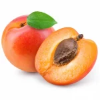 | Apricot | खुबानी |
| 22 |  | Peach | आड़ू |
| 23 |  | Sapota | चिकू |
| 24 |  | Blueberry | ब्लूबेरी |
| 25 |  | Avocado | एवोकाडो |
| 26 | 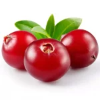 | Cranberry | क्रैनबेरी |
| 27 | 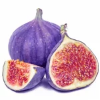 | Fig | अंजीर |
| 28 |  | Gooseberry | अमला |
| 29 |  | Tamarind | इमली |
| 30 |  | Mulberry | शहतूत |
| 31 |  | Date | ख़जूर |
| 32 |  | Guavaberry | जाम्रुट |
| 33 |  | Lemon | नींबू |
| 34 |  | Lime | लाइम |
| 35 |  | Black Currant | ब्लैक करंट |
| 36 |  | Kiwi | किवी फल |
| 37 |  | Jamun | जामुन |
| 38 |  | Indian Gooseberry | आंवला |
| 40 |  | Pear | नाशपाती |
| 42 |  | Star Fruit | कमरख |
| 43 | 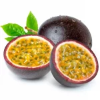 | Passion Fruit | पैशन फ्रूट |
Maximize Health Benefits from 10 Vibrant Fruits
1. Apple

- Benefit: Rich in fibre and antioxidants, apple skins contribute to digestive health and protect cells from damage.
- Tips and Explanation:
- Variety: Include different apple varieties for a spectrum of nutrients.
- Washing: Thoroughly wash apples to remove pesticides and contaminants.
- Portion Control: Mindful eating to avoid excessive natural sugar intake.
- Enjoy the Skin: Consume apple skins for added fibre and antioxidants.
2. Banana

- Benefit: Potassium-rich bananas help regulate blood pressure and support heart health.
- Tips and Explanation:
- Storage: Allow bananas to ripen at room temperature.
- Portion Control: Moderate consumption due to natural sugars.
- Frozen Fruits: Freeze ripe bananas for a convenient and nutritious snack.
- Hydration: Contribute to hydration with their water content.
3. Mango

- Benefit: High in vitamin A and beta-carotene, mangoes promote good eyesight and skin health.
- Tips and Explanation:
- Seasonal Fruits: Choose ripe mangoes in season for optimal taste and nutrients.
- Natural Sweetness: Satisfy sweet cravings naturally with mangoes.
- Fruit Salad: Include mangoes in vibrant fruit salads for added flavour.
- Versatility: Use mangoes in both sweet and savoury dishes.
4. Kiwi

- Benefit: Kiwi is rich in vitamin C and antioxidants, supporting the immune system.
- Tips and Explanation:
- Allergies: Be cautious of kiwi allergies; consult professionals if needed.
- Enjoy the Skin: Consume the skin for additional nutrients.
- Fruit Juices: Opt for 100% natural kiwi juice without added sugars.
- Diverse Flavors: Add kiwi to dishes for a unique flavor.
5. Papaya

- Benefit: Papaya, rich in dietary fibre, aids digestion and prevents constipation.
- Tips and Explanation:
- Weight Management: Low-calorie content supports weight management.
- Detoxification: Papaya aids in detoxifying the body.
- Improved Vision: Vitamin A in papaya contributes to maintaining good eyesight.
- Smoothies: Blend papaya into smoothies for added nutritional benefits.
6. Guava

- Benefit: Guava, which is high in dietary fiber, aids digestion and promotes gut health.
- Tips and Explanation:
- Seasonal Fruits: Choose fresh, seasonal guavas for optimal taste.
- Weight Management: Low-calorie fruit supports weight management.
- Heart Health: Potassium content supports heart health.
- Versatility: Use guava in salads or as a standalone snack.
7. Berries (e.g., Blueberries)

- Benefit: Berries are rich in antioxidants, helping protect cells from free radical damage.
- Tips and Explanation:
- Storage: Refrigerate berries to extend shelf life.
- Frozen Fruits: Opt for frozen berries for convenience and nutrition.
- Fibre-rich: Consume whole berries for maximum fiber intake.
- Reduced Risk of Chronic Diseases: Regular berry consumption linked to lower chronic disease risk.
8. Watermelon

- Benefit: High water content in watermelon helps keep the body hydrated, especially in hot weather.
- Tips and Explanation:
- Hydration: Consume watermelon as a hydrating snack.
- Seasonal Fruits: Choose ripe watermelons in season for better taste.
- Fruit for Dessert: Use watermelon as a refreshing dessert alternative.
- Storage: Keep cut watermelon in the refrigerator for freshness.
9. Orange

- Benefit: Oranges are rich in calcium and vitamin D, essential for strong bones and teeth.
- Tips and Explanation:
- Weight Management: Low-calorie content supports weight management.
- Fibre-rich: Consume whole oranges for fibre and nutritional benefits.
- Energy Boost: Natural sugars provide a quick and sustainable energy source.
- Heart Health: Potassium content contributes to heart health.
10. Grape

- Benefit: Grapes, particularly red grapes, contain antioxidants contributing to overall health.
- Tips and Explanation:
- Portion Control: Moderate consumption due to natural sugars.
- Dried Fruits: Choose dried grapes (raisins) without added sugars or preservatives.
- Antioxidants: Consume grapes for their antioxidant content.
- Smoothies: Blend grapes into smoothies for a sweet and nutritious flavor.
Exploring the Rich Tapestry of Indian Fruits: 15 Exquisite Varieties

Mango (आम): Known as the “King of Fruits,” mango is loved for its sweet, juicy, and tropical flavour. India has many varieties of mangoes, each with its unique taste and texture.

Banana (केला): Bananas are one of the most popular and widely consumed fruits in India. They are a good source of potassium and provide quick energy due to their high carbohydrate content.

Guava (अमरूद): Guavas are rich in vitamin C and dietary fibre. They have a unique flavour that combines sweetness with a hint of tartness.

Pomegranate (अनार): Pomegranates are known for their antioxidant-rich seeds, which are juicy and slightly tart. They are often consumed as fresh fruit or in juice form.

Watermelon (तरबूज): Watermelons are a refreshing summer fruit. They have high water content, making them an excellent choice to beat the heat.

Lychee (लीची): Lychees are small, sweet, and fragrant fruits with a rough, reddish-brown peel. They are often enjoyed fresh and are a seasonal delicacy.

Jackfruit (कटहल): Jackfruit is the largest tree-borne fruit in the world. It has a fibrous texture and a sweet, tropical flavour. It’s used in both ripe and unripe forms in various Indian dishes.

Coconut (नारियल): Coconuts are versatile fruits used in various forms, such as coconut water, coconut milk, and grated coconut. They are rich in healthy fats and nutrients.

Grape (अंगूर): Grapes come in various colours and are a source of antioxidants. They can be enjoyed fresh or in the form of raisins.

Sapota (चिकू): Also known as chikoo, sapota is a sweet and grainy-textured fruit. It’s often eaten fresh or used in milkshakes and desserts.

Apricot (खुबानी): Apricots are small, orange fruits with a sweet and slightly tart taste. They are a good source of vitamin A and dietary fibre.

Pear (नाशपाती): Pears are sweet and juicy fruits with a slightly grainy texture. They are often eaten fresh but can also be used in salads and desserts.

Jamun (जामुन): Jamun, also known as black plum, has a tangy and slightly sweet taste. It is known for its potential health benefits, particularly for managing blood sugar levels.

Indian Gooseberry (आंवला): Indian gooseberry, or amla, is a sour and nutritious fruit. It’s often used in Ayurvedic remedies and is a rich source of vitamin C.

Custard Apple (शरीफा): Custard apples have sweet, creamy flesh with a unique flavour. They are often eaten fresh, and their pulp is used in desserts and milkshakes.
Seasonal Delights: A Guide to Enjoying India’s Bounty of Fresh Fruits
Winter Fruits (December to February):
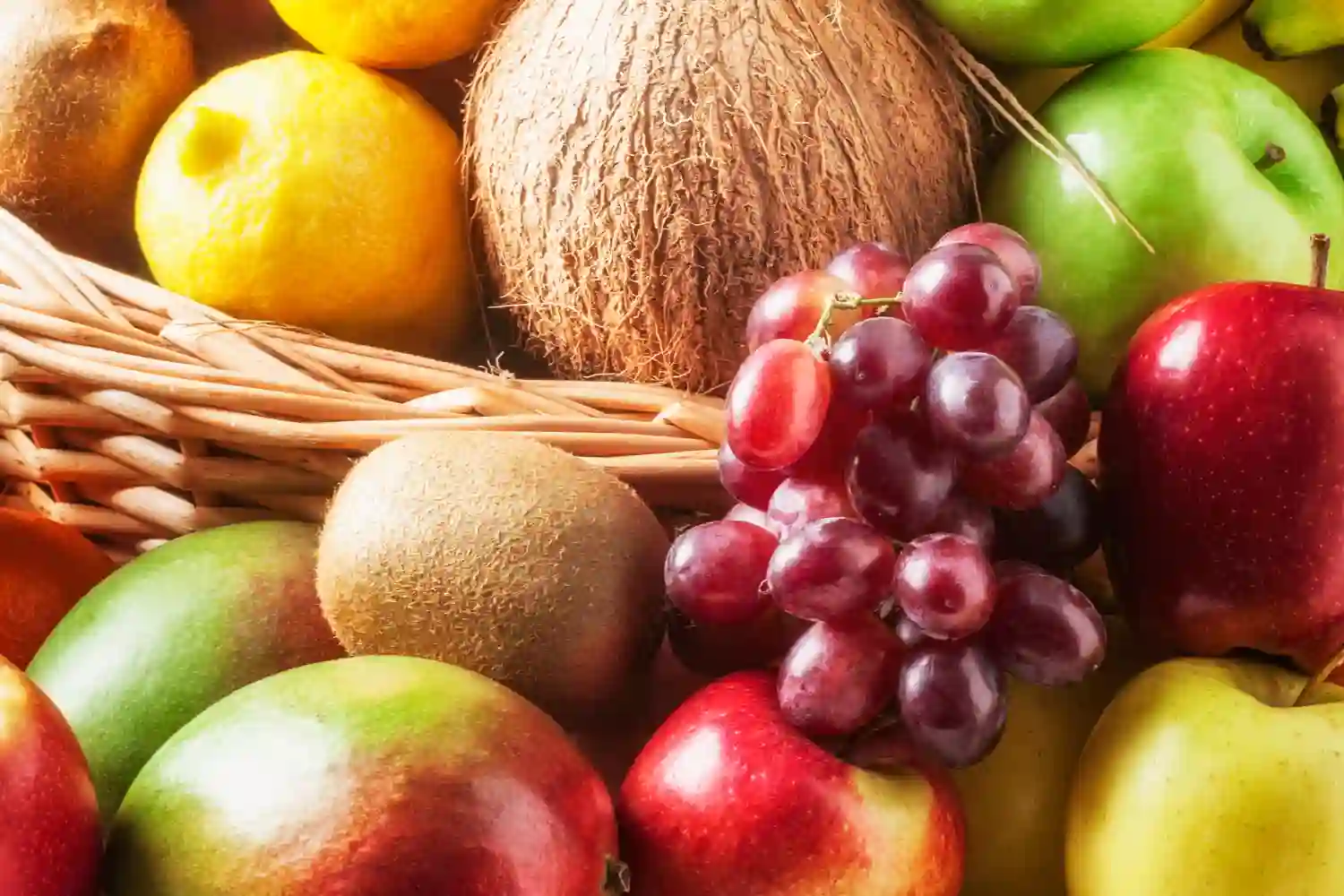
- Oranges
- Guavas
- Apples
- Pomegranates
- Grapes
- Papayas
- Kiwis
- Custard Apples (Sharifa)
Spring Fruits (March to May):

- Mangoes
- Lychees
- Pineapples
- Watermelons
- Musk Melons (Kharbuja)
- Cherries
- Apricots
- Plums
Monsoon Fruits (June to September):
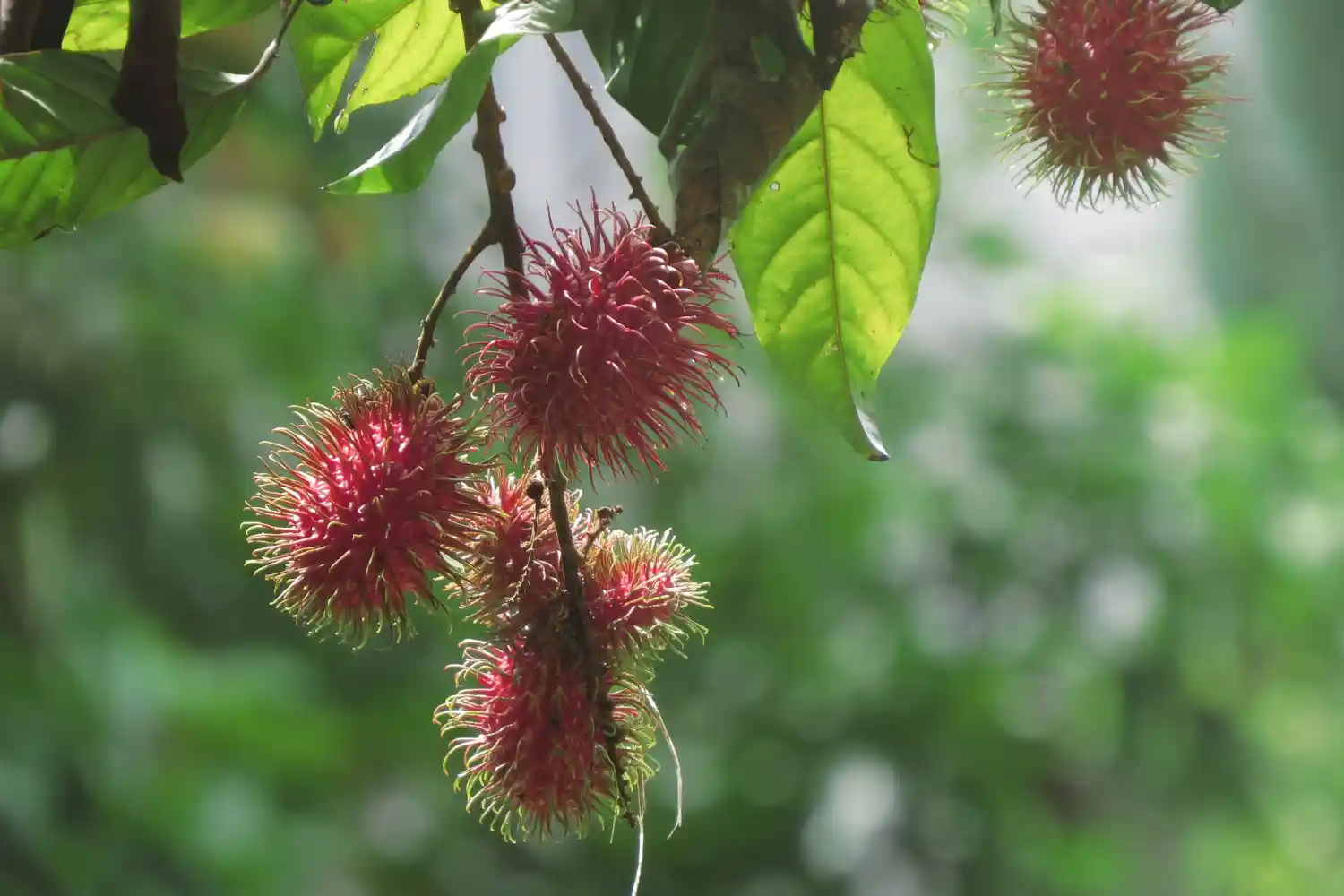
- Jamun (Black Plum)
- Litchis
- Peaches
- Pears
- Bananas
- Indian Gooseberries (Amla)
- Jamun (Black Plum)
- Karonda
- Star Fruit (Kamrakh)
Autumn Fruits (October to November):
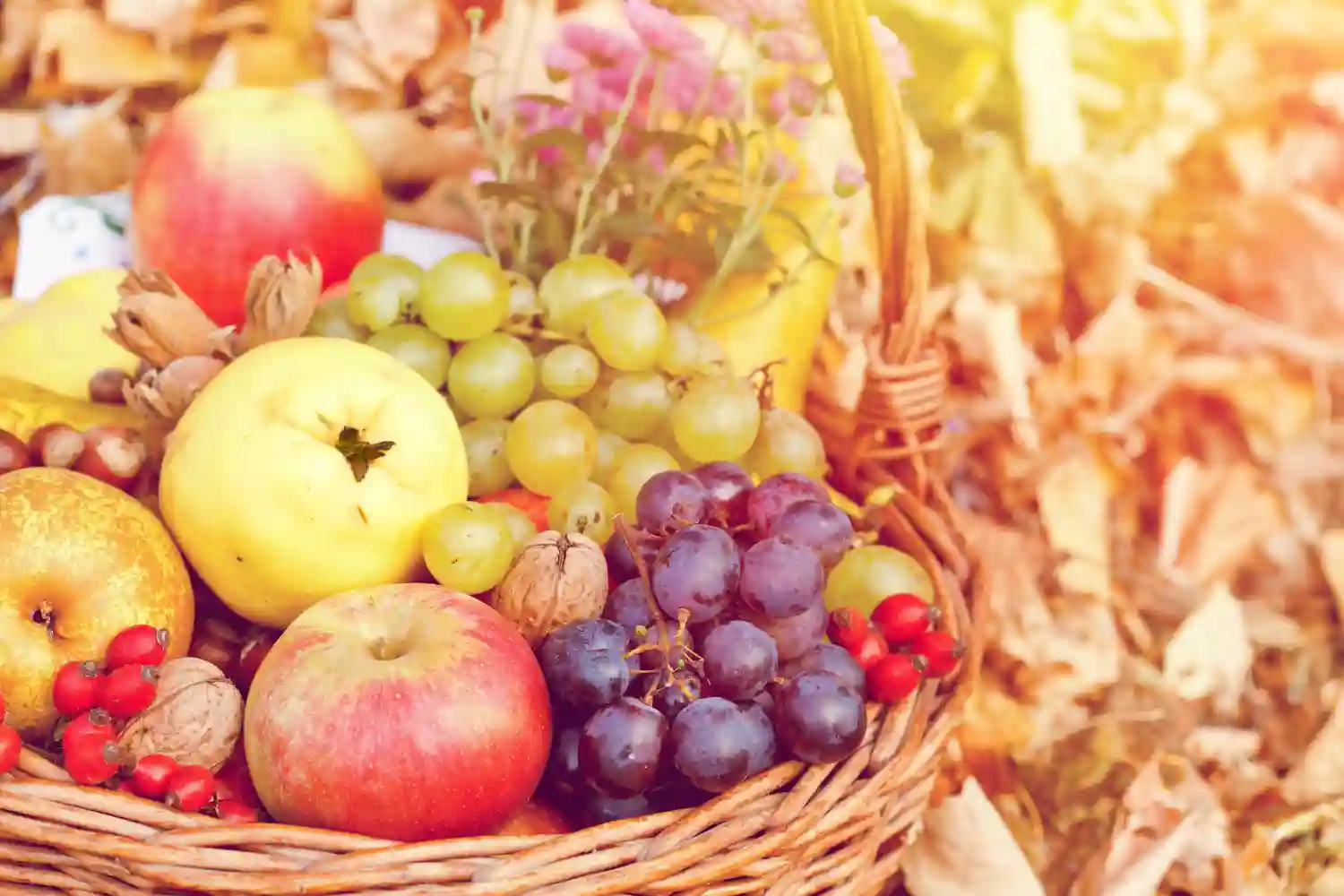
- Grapes
- Pomegranates
- Apple
- Oranges
- Papayas
- Kiwis
- Guavas
- Custard Apples (Sharifa)
How Fruits Enhance the Health of Kids and Seniors
Certainly! Fruits are essential for kids and older adults due to their numerous health benefits.
For Kids:
- Nutrient-Rich Growth: Fruits are packed with essential vitamins and minerals for children’s growth and development. They provide nutrients like vitamin C, A, potassium, and folate.
- Fibre for Digestion: The fibre in fruits aids in digestion and helps prevent constipation, a common issue in children. It promotes healthy bowel movements and maintains digestive health.
- Strong Immunity: Fruits like citrus fruits and berries are rich in vitamin C and antioxidants. These nutrients help strengthen the immune system, reducing the risk of infections and illnesses.
- Healthy Snacking: Fruits make for convenient and healthy snacks. Encouraging kids to snack on fruits instead of sugary or processed snacks can help maintain a balanced diet and prevent excessive sugar intake.
- Hydration: Many fruits have high water content, helping kids stay hydrated, especially in hot weather. Watermelon and oranges are excellent choices for hydration.
- Cognitive Development: Antioxidants in fruits may support cognitive development and improve brain function in children. Omega-3 fatty acids in fruits like avocados are also beneficial for brain health.
- Healthy Weight Management: Fruits are low in calories and fibre, making them a valuable component of a balanced diet. They can help children maintain a healthy weight and reduce the risk of obesity.
For Older Adults:
- Nutrient Density: As people age, their nutrient needs often increase while their calorie intake decreases. Fruits provide essential vitamins, minerals, and antioxidants that older adults need to maintain their health.
- Digestive Health: Many older adults experience digestive issues. Fruits with dietary fibre, such as prunes and apples, can help alleviate constipation and support digestive regularity.
- Heart Health: Fruits like berries and citrus fruits contain compounds that can lower the risk of heart disease by reducing blood pressure and cholesterol levels.
- Bone Health: Fruits rich in vitamin C, such as oranges, can aid in calcium absorption and support bone health. This is important for preventing osteoporosis in older adults.
- Reduced Risk of Chronic Diseases: The antioxidants in fruits may help reduce the risk of chronic diseases like cancer, diabetes, and neurodegenerative conditions, which become more common with age.
- Hydration: Staying hydrated becomes crucial as people age. Fruits with high water content, such as melons and cucumbers, can contribute to overall hydration.
- Improved Cognitive Function: Some fruits, like blueberries, have been linked to improved cognitive function and memory, which benefit older adults.
- Oral Health: Chewing fruits can stimulate saliva production, which aids in maintaining oral health and preventing dry mouth, a common issue in older individuals.
Conclusion
Exploring Indian fruits and their names in English has been a delightful and enriching journey. Through this colourful odyssey, we’ve learned the names of these fruits and tasted India’s cultural diversity and natural richness. Each fruit’s unique flavour, aroma, and texture tells a story of its land, the traditions it represents, and the people who cherish it.
This journey has expanded our vocabulary and broadened our understanding of the rich agricultural heritage of India. From the sweet Alphonso mangoes of Maharashtra to the tangy Jamun of North India and the exotic lychee of the East, each fruit is a testament to the country’s geographical and climatic diversity. Moreover, it showcases the deep connection between Indians and their land, where fruits are not just sources of nutrition but also symbols of celebration, rituals, and festivities.
FAQ’s
What are the health benefits of eating fruits regularly?
Explore the numerous health advantages of incorporating fruits into your diet.
Which fruits are in season during summer, and why is it important to eat seasonally?
Learn about the benefits of consuming fruits that are in season and discover some delicious summer fruits.
Can you list exotic fruits and their unique flavours?
Discover exotic fruits from around the world and the distinct tastes they offer.
How can I store fruits to keep them fresh for longer?
Find out storage tips and tricks to extend the shelf life of your favourite fruits.
What are the most popular fruits for making homemade smoothies?
Explore fruit options that can elevate the taste and nutrition of your smoothies.
Are there any fruits that are considered superfoods?
Delve into the world of superfruits and their exceptional nutritional benefits.
What are some creative ways to incorporate fruits into savoury dishes?
Learn about unexpected but delicious ways to use fruits in savoury recipes.
How can I tell if a fruit is ripe and ready to eat?
Get tips on identifying the ripeness of different fruits to enjoy them at their best.
What are the nutritional differences between fresh and frozen fruits?
Understand the nutritional value of fresh and frozen fruits and when to choose one over the other.
Which fruits are low in sugar for those with dietary restrictions?
Discover fruits that are lower in sugar content and suitable for individuals with dietary concerns.
Can you recommend fruits that promote better skin and hair health?
Find out which fruits can help enhance your skin and hair health naturally.
What fruits are ideal for growing in home gardens or small spaces?
Learn about fruit varieties well-suited for home gardening, even in limited spaces.
How can I introduce a variety of fruits into my child’s diet?
Get tips and ideas for making fruits appealing to children and encouraging healthy eating habits.
What are some fun and informative facts about the history and cultural significance of certain fruits?
Explore the intriguing stories and cultural significance of specific fruits worldwide.

Hello! I’m Yash Pandya, a dedicated Horticulture Manager at Nayara Refinery. With a passion for creating breathtaking green spaces, I manage a lush landscape and a thriving orchard of 90,000 mango trees.
Expertise: 🌿 Horticulture Management: I plan and maintain gardens, ensuring tranquility and beauty. 🌳 Mango Orchard Expert: I optimize mango yields and health using advanced techniques. 🌺 Landscape Design: My designs harmonize aesthetics with eco-friendly practices. 🌍 Collaboration & Leadership: I foster teamwork, empowering my team to excel.
Experience:
Horticulture Manager at Nayara Refinery.
Student Placement Coordinator: Facilitated student-company connections.
Research And Development Intern: Worked on organic farming practices.
Let’s connect and continue cultivating a greener, more beautiful world! 🌱 #HorticultureManager #LandscapeDesign #SustainabilityInAgriculture


